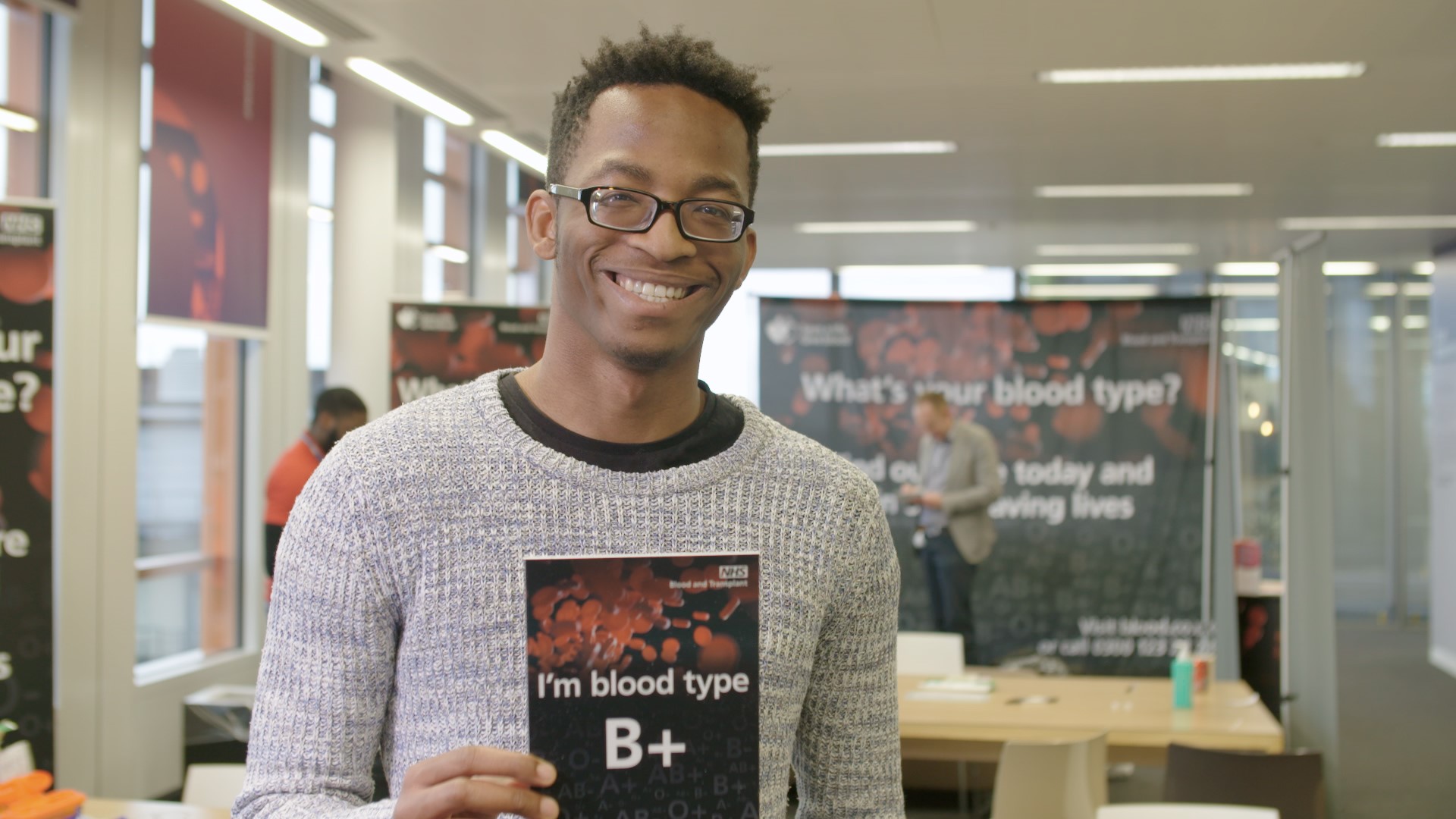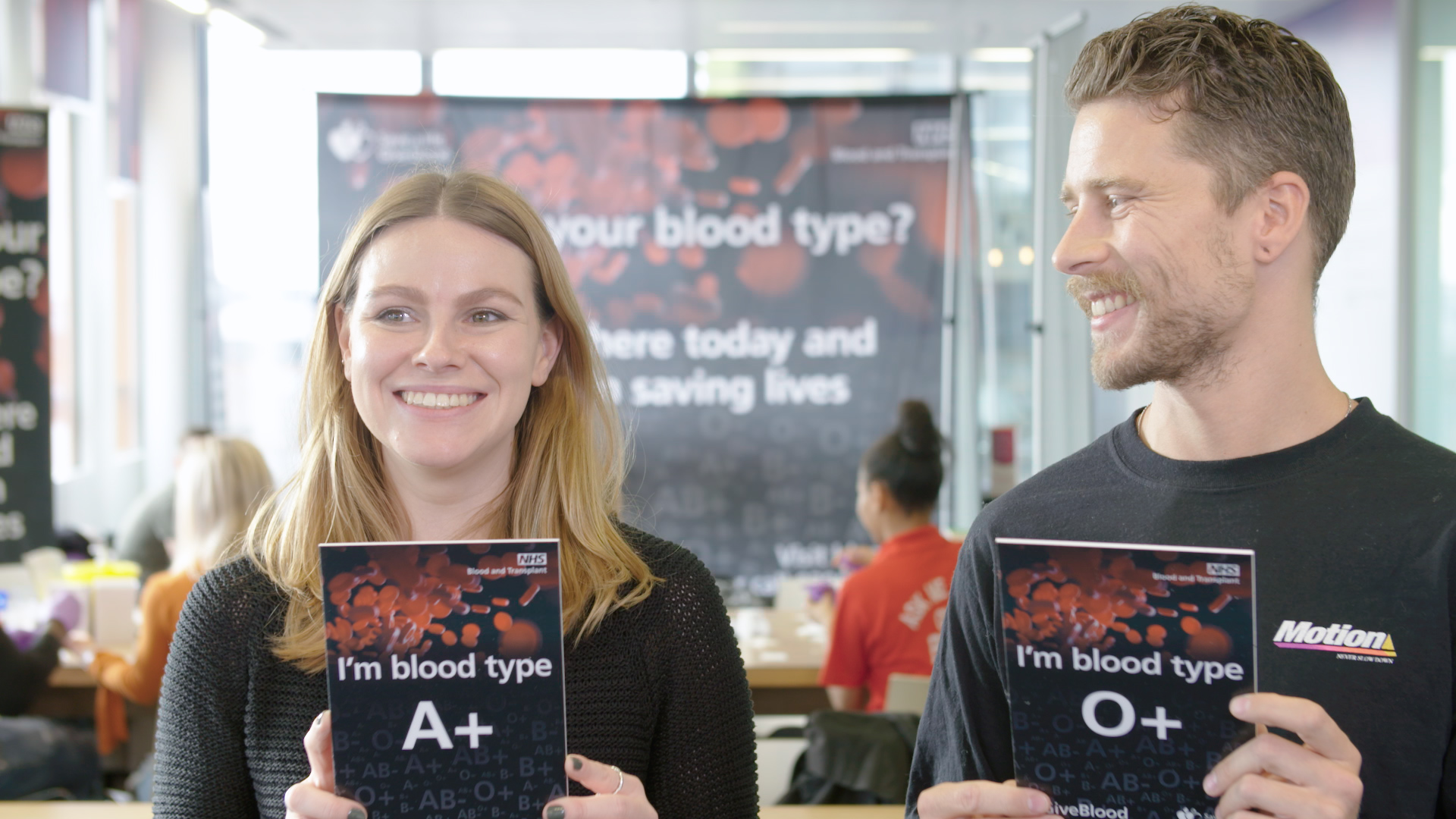4,900 new blood donors needed this February
We're recruiting new donors with high priority blood types.
With February a time for finding your perfect match, NHS Blood and Transplant is running 24 ‘What’s Your Type’ blood testing events in cities and towns through February during England.
 ‘What’s Your Type’ is an event where trained NHS Blood and Transplant staff test your blood with a finger prick test, to find out your blood type. The test only takes a few minutes and you are able to see the results live in front of you.
‘What’s Your Type’ is an event where trained NHS Blood and Transplant staff test your blood with a finger prick test, to find out your blood type. The test only takes a few minutes and you are able to see the results live in front of you.
There is a rising need for certain key blood types. Between 2014 to 2018, there was a 13% increase in the proportion of O negative being issued to hospitals. O negative is the universal donor group which can be given to almost anyone. (1)
The campaign aims to increase awareness of blood types, educate on how each one contributes to saving lives, and recruit more priority donors to meet hospital demand.
New figures reveal only 44% of people know their blood type. 32% of these people knowing their blood type through becoming a blood donor, 21% through pregnancy, and 9% through hospital procedure. (2)
NHS Blood and Transplant welcomes new donors of every blood type, however, we urgently need new blood donors with O negative, A negative, and B negative as these are the priority blood types. (3)
The NHS particularly needs more black people to donate blood. People from black communities are more likely to have the blood disorder sickle cell which can mean they need regular blood transfusions. Donors from the same ethnic background are more likely to have matching blood.
In 2018 NHS Blood and Transplant issued 1,391,322 units of red blood cells to hospitals all over England. Of which around 49% was O type blood, 11% was B type blood, 38% was A type blood, and 3% was AB type blood.
NHS Blood and Transplant is holding 24 What’s Your Type events across England.
People taking the test can also register as new donors. NHS Blood and Transplant always needs new blood donors to replace those who can’t donate anymore and to ensure we have the right mix of donors to meet patient needs now and in the future. (4)
One blood donation can save or improve the lives of up to three people.
Mike Stredder, NHS Blood and Transplant Director of Blood Donation, said: “People are always curious to find out their blood type and why it is special.
“What’s Your Type events are a fun way to find out and we’d love people to come along and learn how their group is special for saving lives – and you might meet your perfect match.”
He added: “We need new blood donors in order to ensure we have the right blood to help patients. We need 4,900 donors this February alone at our donation centres. It’s quick and easy to donate. But if you can’t find an appointment, don’t worry – book in the future as we need life-savers every day.”
Every day, 6,000 blood donors across the country make a difference; saving people whose lives depend on blood. Whether it is patients receiving treatment for cancer, blood disorders, after accidents, surgery or during childbirth.
It is quick and easy to make, view and change appointments by calling 0300 123 23 23, using the GiveBlood app, or going online at www.blood.co.uk
If there are no available blood donation appointments near you in February, people don’t need to worry. If people donate for the first time in a few weeks or a few months instead, they will still be saving lives.
Contact us
For information please contract Harriet Summerhayes on 07825754782 or harriet.summerhayes@nhsbt.nhs.uk
For additional information please contact the press office on 01923 367 600 or email pressoffice@nhsbt.nhs.uk
Press release notes
(1) The rising demand for O negative is largely being driven by the rise in sickle cell disease, the fastest growing genetic disorder in England. People with sickle cell often need blood transfusions. The disease is more common in black people but there is a shortage of black donors. O negative is often used as an alternative when there is no match for that patient.
(2) Kantar TNS/Research Express conducted a survey in January 2019 (10th – 14th) with a representative sample of 1090 men and women in England (aged 16+), with a margin of error of +/- 3%.
O negative – The universal blood group that can be given to everyone. It is often used when a patient’s blood type is not known, for example in an emergency situation.
B negative – Only 2% of donors are B negative and finding news donors is difficult. B negative can be used as an alternative for patients with blood disorders when not enough B positive is available.
A negative – A negative has platelets which can be given to anyone. Platelets are tiny cells that help stop bleeding – they are especially important for cancer patients.
(4) The percentage of people who can receive the red cells from each blood group:
- A positive – 31.5%
- A negative – 38.4%
- B positive – 11.9%
- B negative – 14.5%
- O positive – 81.6%
- O negative – 100%
- AB positive – 2.7%
- AB negative – 3.3%
Notes
NHS Blood and Transplant is a joint England and Wales Special Health Authority. We provide the blood donation service for England and the organ donation service for the UK. We also provide donated tissues, stem cells and cord blood. We are an essential part of the NHS, saving and improving lives through public donation.
It is quick and easy to book an appointment to give blood. Call 0300 123 23 23 or visit www.blood.co.uk
NHS Blood and Transplant needs to collect 1.4 million units of blood each year to meet the needs of patients across England.
The overall demand for blood is falling by 3-4% per year due to improvements in clinical practice and our work with hospitals to ensure blood is used appropriately for patients.
We need nearly 210,000 new blood donors each year to replace those who stop donating and to ensure we have the right mix of blood groups to match patient needs in the future
We urgently need 40,000 more black donors as they are more likely to have the blood type needed to treat the increasing number of patients suffering from sickle cell disease.
